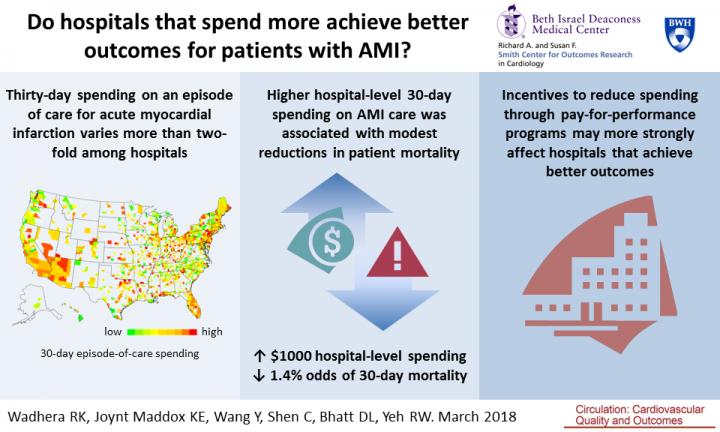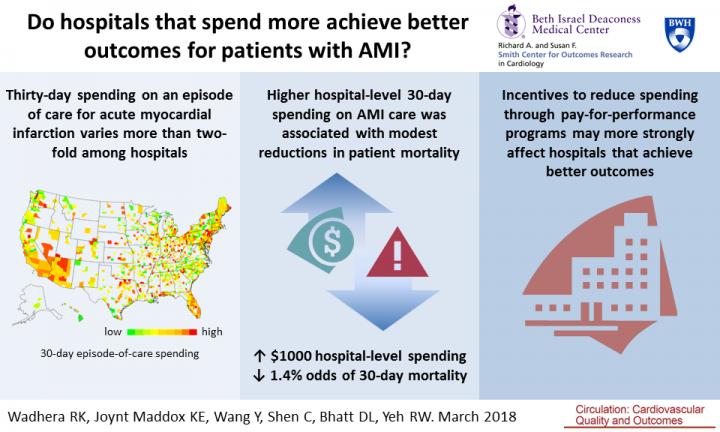
Credit: Smith Center for Outcomes Research in Cardiology at Beth Israel Deaconess Medical Center
BOSTON — In recent years, there has been a growing emphasis on improving the value of health care by incentivizing reduced spending and improved outcomes. One such effort is the Hospital Value-Based Purchasing Program administered by the Centers for Medicare and Medicaid Services (CMS). The program makes payments to hospitals based on several measures, including average spending for an episode of care and mortality rates for certain conditions, such as acute myocardial infarction (AMI), or heart attack. Hospitals that perform poorly in these measures receive reduced payments.
A new, large-scale study – led by researchers at the Smith Center for Outcomes Research in Cardiology at Beth Israel Deaconess Medical Center (BIDMC) and published online today in Circulation: Cardiovascular Quality and Outcomes – examined the relationship between 30-day episode spending for inpatient and post-discharge care and patient mortality following a hospital admission for heart attack.
"Pay-for-performance programs such as the Hospital Value-Based Purchasing Program have recently been under fire given the absence of strong evidence that they actually improve care quality," said first author Rishi K. Wadhera, MD, MPhil, an investigator at the Smith Center at BIDMC and a cardiology fellow at Brigham and Women's Hospital. "In this study we found that higher 30-day spending to care for Medicare beneficiaries who recently experienced a heart attack was associated with a modest reduction in patient mortality."
Using national Medicare claims data, the researchers examined more than 640,000 hospitalizations involving patients 65 years or older hospitalized for heart attack at an acute care hospital between July 2011 and June 2014.
"Recent policy efforts have focused on improving the value of care, both in terms of total spending and patient outcomes," said senior corresponding author Robert W. Yeh, MD, MSc, Director of the Smith Center for Outcomes Research in Cardiology at BIDMC. "We need to understand whether programs like the Hospital Value-Based Purchasing Program are able to globally reduce spending and improve outcomes for acute conditions like AMI, or whether the strong incentive to reduce hospital spending has unintended adverse consequences."
"These findings have important implications for patient care," said Wadhera. "While this study found that increased spending was associated with better outcomes, not all spending is of equal value and further research is needed to find out why higher-spending hospitals have better outcomes."
###
In addition to Wadhera and Yeh, study coauthors include Smith Center researchers Yun Wang, PhD, and Changyu Shen, PhD; Deepak L. Bhatt, MD, MPH, of Brigham and Women's Hospital Heart & Vascular Center; and Karen E. Joynt Maddox, MD, MPH, of Washington University School of Medicine.
This work was supported by National Institutes of Health Training Grant T32HL006704-32.
Media Contact
Lindsey Diaz-MacInnis
[email protected]
617-667-7372
@BIDMCNews
http://www.bidmc.harvard.edu





